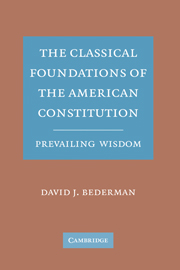2 - Classical Political Models and the Founders
Published online by Cambridge University Press: 25 July 2009
Summary
Hannah arendt observed in her book, on revolution, that “without the classical example … none of the men of the revolutions on either side of the Atlantic would have possessed the courage for what then turned out to be unprecedented action.” As has already been narrated in Chapter 1, the Framing generation regarded the classical tradition as granting useful knowledge and valuable historic precedent on what John Adams called “the divine science of politics.” Classical antiquity also provided the crucial set of political models (and their dystopian counterparts) from which the Framers could draw upon in inspiration of their new government. As Adams observed in 1765, “the knowledge of the principles and construction of free governments … have remained at a full stand for two or three thousand years,” and so he turned his attention to “the ancient seats of liberty, the Republics of Greece and Rome.” Later, in writing to Lafayette in 1782, he indicated that “I [am] … a republican on principle…. Almost every thing that is estimable in civil life has originated under such governments. Two republican powers, Athens and Rome, have done more honor to our species than the rest of it. A new country can be planted only by such a government.” Or, as William Livingston referred to in his Independent Reflector, published in 1753, “those free Governments of old, whose History we so much admire, and whose Example we think it an Honor to imitate.”
- Type
- Chapter
- Information
- The Classical Foundations of the American ConstitutionPrevailing Wisdom, pp. 50 - 94Publisher: Cambridge University PressPrint publication year: 2008



